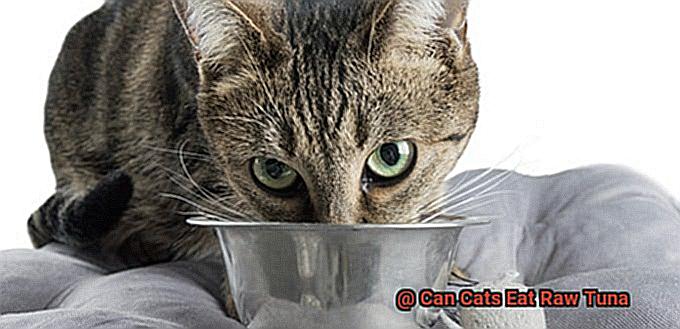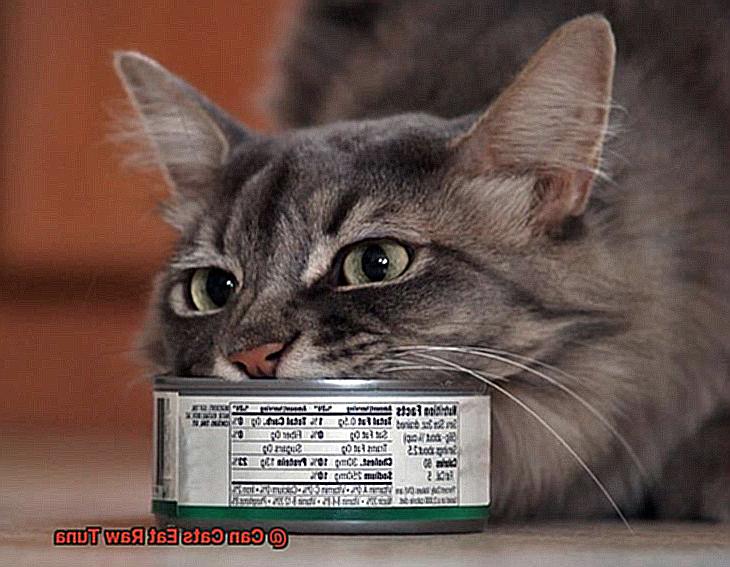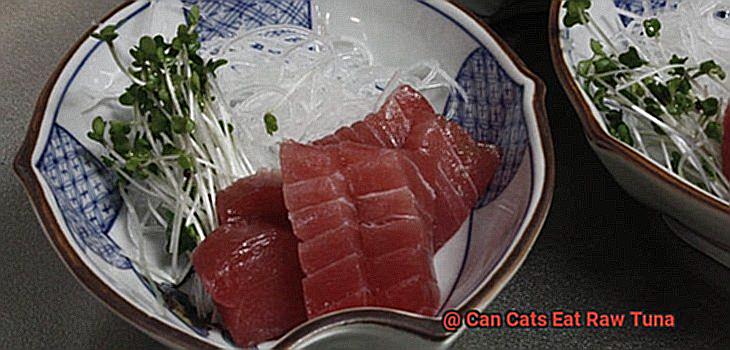Can cats eat raw tuna? Many cat owners have this question. It’s tempting to tell your furry friend what kind of food is safe for them and what isn’t.
Cats are obligate carnivores, so certain types of fish, like raw tuna, can be part of a healthy diet. But there are some things to consider before feeding your cat raw tuna.
First, never feed canned or smoked tuna as these kinds of fish are high in mercury and other toxins that can be dangerous to cats. Choose sushi-grade or sashimi-grade raw tuna instead.
Also, the fish should be fresh and free of parasites and bacteria that could cause food poisoning or other health problems. Small amounts of raw tuna should be part of a balanced diet – too much could lead to nutritional imbalances in your pet.
So while cats can safely eat raw tuna, it’s important to do so responsibly and closely monitor how much they consume as part of their overall diet.
Nutritional Benefits of Raw Tuna for Cats

Raw tuna is a delicious treat for cats that can provide a variety of health benefits.
It contains high levels of protein, essential amino acids, omega-3 fatty acids, vitamins and minerals, as well as a low carbohydrate diet – all of which are essential for keeping your cat healthy. While raw tuna should not be used as the primary source of cat food, it can be included in their diet as an occasional supplement.
If you’re looking to give your cat an extra boost of nutrition, feeding them raw tuna is a great option. The protein in raw tuna helps to build and maintain muscle mass while the omega-3 fatty acids promote a healthy coat and skin.
Additionally, the vitamins and minerals found in raw tuna help to strengthen their immune system and provide essential nutrients for overall wellbeing. It is important to remember that when feeding cats raw food there are certain risks involved.
There is also the risk of bacterial contamination when feeding cats raw food, so make sure the fish is clean and safe before giving it to them.

Potential Risks of Feeding Cats Raw Tuna

Raw tuna can be a tempting treat for cats, providing them with essential proteins, amino acids, vitamins and minerals.
However, there are potential risks associated with feeding your feline friend this type of food that you should be aware of. Firstly, tuna contains high levels of mercury which can be toxic to cats when ingested in large quantities.
Mercury poisoning can cause a range of symptoms, such as tremors, seizures and even death. Secondly, raw fish contains enzymes that break down thiamine – an essential vitamin for cats – potentially leading to neurological problems like blindness and seizures if left untreated.
Additionally, raw fish may contain bacteria like Salmonella and E. Coli which can cause digestive upset or serious illness in cats. Furthermore, small bones in raw tuna pose a choking hazard or can damage the cat’s digestive tract if swallowed.
Thiamine Deficiency and Its Effects on Cats
Thiamine deficiency can be a life-threatening issue for cats, so it’s important to be aware of the risks and symptoms.
Thiamine is an essential vitamin that aids in proper organ function and metabolism, but it can easily be destroyed by high temperatures, freezing, or long periods of storage. This means that feeding cats raw fish, such as tuna, can be risky if the fish isn’t fresh or has been frozen for a lengthy time.
Symptoms of thiamine deficiency in cats may include loss of appetite, vomiting, and weight loss. As the deficiency progresses, cats may also develop neurological problems such as seizures, difficulty walking, and decreased coordination.
In severe cases, untreated thiamine deficiency can lead to death. If you suspect your cat is suffering from a thiamine deficiency, it’s crucial to seek medical attention right away.
Treatment may involve supplementation with thiamine injections and a switch to a more nutritionally balanced diet that avoids raw fish as a primary food source.
Bacterial Contamination and Its Impact on Cats
Salmonella, Listeria, and E. coli are the most common pathogens associated with raw tuna that can cause serious illnesses in cats. Symptoms of foodborne illness include vomiting, diarrhea, lethargy, fever, and dehydration.
In severe cases, these may even lead to death. Therefore, it is essential to take the necessary safety measures when feeding your cat raw tuna.
Proper storage and handling can reduce the risk of bacterial contamination. In addition, cooking the tuna thoroughly will further minimize any potential dangers.
Cats with weakened immune systems or other health conditions may be more vulnerable to infections from contaminated raw tuna. If your cat falls into this group, make sure to get advice from your veterinarian before adding raw tuna to their diet.
Overall, while raw tuna may offer some health benefits for cats, it is important to prioritize their safety and well-being by taking appropriate precautions to ensure that the raw tuna they consume is free from bacterial contamination.
How to Safely Feed Your Cat Raw Tuna
Raw tuna can be an enticing treat for cats due to its delicious taste and high protein content. However, feeding your cat raw tuna comes with potential risks that could harm their health. To ensure your cat’s safety, here are some tips on how to safely feed them raw tuna.
Choose High Quality, Fresh Tuna
When selecting raw tuna for your cat, always look for sushi-grade quality that has been properly handled and stored. This will reduce the risk of contamination from bacteria or parasites.
Cook the Tuna Thoroughly
To kill any bacteria or parasites that may be present in the fish, cook the tuna thoroughly before feeding it to your cat. This will also make it easier for them to digest and reduce any potential health risks associated with eating raw fish.
Feed Raw Tuna as an Occasional Treat
Raw tuna should never be used as a primary source of protein in your cat’s diet. Rather, treat it as an occasional treat in small amounts and supplement their diet with other sources of protein such as cooked chicken, turkey, or fish.

Monitor Your Cat Closely
If you choose to feed your cats raw tuna, watch them closely for signs of vomiting or diarrhea after eating it. Any adverse reactions should be taken seriously and evaluated by a veterinarian immediately.
Overall, while raw tuna can be a tempting treat for cats, it’s important to take precautions to ensure their health and safety when feeding them this type of food.
How Much Raw Tuna Should You Feed Your Cat?
As with any food, it’s best to think of tuna as a treat rather than a staple.
The general recommendation is to feed your cat no more than 10% of their daily caloric intake in treats or human food, which equates to around 20-30 calories per day for an adult cat. It’s also important to ensure that the tuna is fresh and of high quality, as fish that has been left out too long can contain harmful bacteria such as salmonella.
Raw tuna contains high levels of thiaminase, which can break down thiamine (a key B-vitamin) in your cat’s body, leading to a thiamine deficiency. To prevent this from occurring, balance the tuna with other thiamine-rich foods such as organ meats and supplements.
When feeding raw tuna to your cat, keep portions small and infrequent – one or two small pieces per week should suffice as a treat.
i2z1SvRzN9U” >
Other Protein Sources for Cats

Cats are carnivores and need a high-protein diet to stay healthy and happy.
Raw tuna may be a tempting option, but it should be given in moderation due to the potential for bacterial contamination. Luckily, there are plenty of other protein sources that cat owners can turn to.
For instance, cooked and unseasoned chicken or turkey is an excellent lean protein source that cats can easily digest. Eggs are another great option, but they must be cooked thoroughly to avoid salmonella.

Fish such as shrimp or canned salmon can also provide cats with essential nutrients, but it should not be the primary source of protein as it lacks certain vitamins and minerals that cats need. Variety is key when it comes to feeding cats.
Also Read: Can Cats Eat Sushi Grade Fish? – 21Cats.org
Conclusion
Raw tuna can be a delicious and nutritious treat for cats – but only when served properly.
It’s high in protein, essential amino acids, vitamins, and minerals – but it also carries risks. Too much tuna can lead to mercury poisoning and thiamine deficiency.
There’s also a chance of bacterial contamination that could cause food poisoning or serious illness. Therefore, owners should take precautions: choose sushi-grade tuna that has been handled and stored correctly, cook it thoroughly before serving, feed it as an occasional snack in small amounts, and monitor their cats closely for any adverse reactions afterwards.
Alternatives like baked chicken or turkey are also great choices for cats who require a more balanced diet without the potential health hazards of raw fish.







